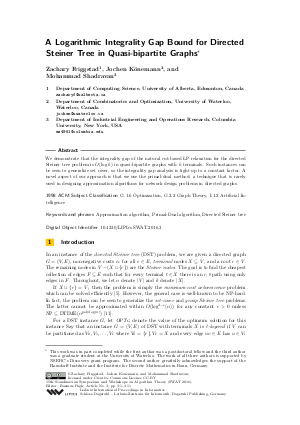A Logarithmic Integrality Gap Bound for Directed Steiner Tree in Quasi-bipartite Graphs
Authors Zachary Friggstad, Jochen Könemann, Mohammad Shadravan
-
Part of:
Volume:
15th Scandinavian Symposium and Workshops on Algorithm Theory (SWAT 2016)
Part of: Series: Leibniz International Proceedings in Informatics (LIPIcs)
Part of: Conference: Scandinavian Symposium and Workshops on Algorithm Theory (SWAT) - License:
 Creative Commons Attribution 3.0 Unported license
Creative Commons Attribution 3.0 Unported license
- Publication Date: 2016-06-22
File

PDF
LIPIcs.SWAT.2016.3.pdf
- Filesize: 0.49 MB
- 11 pages
Document Identifiers
Subject Classification
Keywords
- Approximation algorithm
- Primal-Dual algorithm
- Directed Steiner tree
Metrics
- Access Statistics
-
Total Accesses (updated on a weekly basis)
0PDF Downloads0Metadata Views
Abstract
We demonstrate that the integrality gap of the natural cut-based LP relaxation for the directed Steiner tree problem is O(log k) in quasi-bipartite graphs with k terminals. Such instances can be seen to generalize set cover, so the integrality gap analysis is tight up to a constant factor. A novel aspect of our approach is that we use the primal-dual method; a technique that is rarely used in designing approximation algorithms for network design problems in directed graphs.
Cite As Get BibTex
Zachary Friggstad, Jochen Könemann, and Mohammad Shadravan. A Logarithmic Integrality Gap Bound for Directed Steiner Tree in Quasi-bipartite Graphs. In 15th Scandinavian Symposium and Workshops on Algorithm Theory (SWAT 2016). Leibniz International Proceedings in Informatics (LIPIcs), Volume 53, pp. 3:1-3:11, Schloss Dagstuhl – Leibniz-Zentrum für Informatik (2016)
https://doi.org/10.4230/LIPIcs.SWAT.2016.3
BibTex
@InProceedings{friggstad_et_al:LIPIcs.SWAT.2016.3,
author = {Friggstad, Zachary and K\"{o}nemann, Jochen and Shadravan, Mohammad},
title = {{A Logarithmic Integrality Gap Bound for Directed Steiner Tree in Quasi-bipartite Graphs}},
booktitle = {15th Scandinavian Symposium and Workshops on Algorithm Theory (SWAT 2016)},
pages = {3:1--3:11},
series = {Leibniz International Proceedings in Informatics (LIPIcs)},
ISBN = {978-3-95977-011-8},
ISSN = {1868-8969},
year = {2016},
volume = {53},
editor = {Pagh, Rasmus},
publisher = {Schloss Dagstuhl -- Leibniz-Zentrum f{\"u}r Informatik},
address = {Dagstuhl, Germany},
URL = {https://drops.dagstuhl.de/entities/document/10.4230/LIPIcs.SWAT.2016.3},
URN = {urn:nbn:de:0030-drops-60323},
doi = {10.4230/LIPIcs.SWAT.2016.3},
annote = {Keywords: Approximation algorithm, Primal-Dual algorithm, Directed Steiner tree}
}
Author Details
References
-
J. Byrka, F. Grandoni, T. Rothvoss, , and L. Sanita. Steiner tree approximation via iterative randomized rounding. Journal of the ACM, 60(1), 2013.

-
G. Calinescu and G. Zelikovsky. The polymatroid steiner problems. J. Combinatorial Optimization, 9(3):281-294, 2005.

-
M. Charikar, C. Chekuri, T. Cheung, Z. Dai, A. Goel, S. Guha, , and M. Li. Approximation algorithms for directed steiner problems. J. Algorithms, 33(1):73-91, 1999.

-
I. Dinur and D. Steurer. Analytic approach to parallel repetition. In In proceedings of STOC, 2014.

-
J. Edmonds. Optimum branchings. J. Res. Natl. Bur. Stand., 71:233-240, 1967.

-
U. Feige. A threshold of ln n for approximating set-cover. Journal of the ACM, 45(4):634-652, 1998.

-
Z. Friggstad, A. Louis, Y. K. Ko, J. Könemann, M. Shadravan, and M. Tulsiani. Linear programming hierarchies suffice for directed steiner tree. In In proceedings of IPCO, 2014.

-
M. X. Goemans, N. Olver, T. Rothvoss, and R. Zenklusen. Matroids and integrality gaps for hypergraphic steiner tree relaxations. In In proceedings of STOC, 2012.

-
M. X. Goemans and D. P. Williamson. A general approximation technique for constrained forest problems. SIAM Journal on Computing, 24(2):296-317, 1995.

-
S. Guha, A. Moss, J. Naor, and B. Scheiber. Efficient recover from power outage. In In proceedings of STOC, 1999.

-
E. Halperin and R. Krauthgamer. Polylogarithmic inapproximability. In In proceedings of STOC, 2003.

-
T. Hibi and T. Fujito. Multi-rooted greedy approximation of directed steiner trees with applications. In In proceedings of WG, 2012.

-
C. H. Papadimitriou and K. Steiglitz. Combinatorial Optimization: Algorithms and Complexity. Prentice-Hall, 1982.

-
S. Rajagopalan and V. V. Vazirani. On the bidirected cut relaxation for the metric steiner tree problem. In In proceedings of SODA, 1999.

-
T. Rothvoss. Directed steiner tree and the lasserre hierarchy. Technical report, CORR abs/1111.5473, 2011.

-
V. V. Vazirani. Approximation Algorithms. Springer-Verlag, 2003.

-
A. Zelikovsky. A series of approximation algorthms for the acyclic directed steiner tree problem. Algorithmica, 18:99-110, 1997.

-
L. Zosin and S. Khuller. On directed steiner trees. In In proceedings of SODA, 2002.

